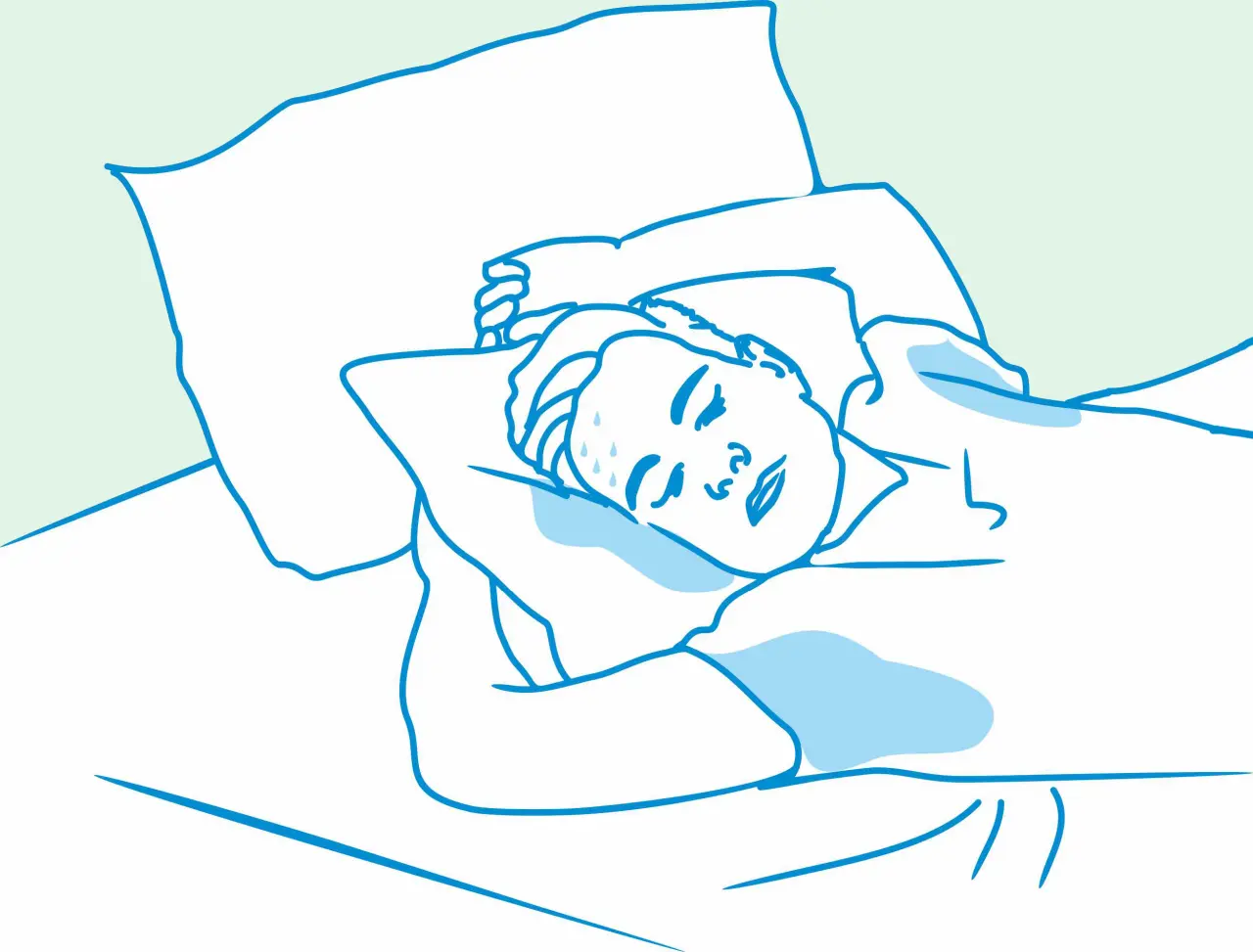To provide services at the highest level, we use cookies. Using the website requires you to choose settings related to their storage on your device. If you want to know what each type of cookie is used for, click the Details button below.
How to overcome night sweats during sleep? 30 czerwca 2023 |

If you suffer from nighttime sweating, choosing the right mattress is crucial for a noticeable improvement in quality of life. A mattress that provides proper air circulation and moisture-wicking can help maintain a dry and comfortable sleep. It is worth investing in a functional mattress that possesses these qualities.
When deciding to purchase a mattress, always choose one made of breathable materials. Avoid both latex mattresses and those constructed with any layer of closed-cell foam labeled by manufacturers with the letter T (traditional). Similarly, mattresses containing memory foam in the top layer retain heat and moisture, which significantly affects not only individuals experiencing nighttime sweating.
Ventilation systems such as the modern Aero 3D mesh in combination with cross channels allow for free airflow within the mattress. This design helps dissipate heat and moisture from the mattress, aided by a mattress protector with three-dimensional mesh.
Pay attention when buying a mattress, especially if you sweat at night on a daily or frequent basis, hygiene aspects of the mattress should also be taken into account. It is worth choosing a hypoallergenic mattress that is resistant to the growth of bacteria, dust mites, and mold. The mattress should also be easy to keep clean, so it should have a removable cover that can be washed.
Choosing a mattress for people who sweat at night may seem very difficult, due to the tricks used by mattress stores eager for profit. However, you are on the website of the right manufacturer whose dream is to provide reasonable people with reliable knowledge to challenge the status quo. By thinking differently, together we create a new reality based on the functional and unparalleled products we create, such as our versatile Osaka Air mattress.
Thanks to the application of the design thinking methodology and following the philosophy of jobs to be done, we create the most functional orthopedic mattresses and pillows. They are designed to satisfy the needs and solve the problems of users for many years. At the same time, the airflow in the Osaka Air mattress ensures the highest comfort for people who sweat at night.
We also encourage you to explore other articles on the best sleep and health blog, as well as the Encyclopedia of Healthy Sleep prepared by the ONSEN® team of specialists. For those who care about spine health, we recommend a set of spine exercises prepared by our physiotherapist.
Night sweats can be caused by infection or inflammation, which raises body temperature and leads to excessive sweating. Night sweats can also be caused by sleeping on a mattress that has a top layer of memory foam, which doesn't allow for proper airflow. This applies not only to mattresses but also to memory foam pillows. Additionally, during menopause, hormonal fluctuations, especially estrogen, can lead to night sweats, commonly referred to as hot flashes. Strong emotions, stress, or anxiety can also affect the activity of the nervous system and lead to sweating during sleep. However, it's important to note that some people have a natural tendency to sweat excessively, especially at night, which may be related to a sweating disorder such as hyperhidrosis.
Night sweats can be a symptom of certain types of cancers, but it is not specific to just one type of cancer. Among the cancers that can cause night sweats, the most common is lymphoma, as well as kidney cancer and blood cancer. In the case of lymphoma, which is a cancer of the lymphatic system, there is an enlargement of lymph nodes, which leads to night sweats. It is also a common symptom of kidney cancer and leukemia. However, it's worth noting that night sweats can also have many other causes that are not related to cancer. It's important to consult a doctor to evaluate the underlying cause and consider appropriate tests.
If you're experiencing night sweats, it's worth consulting a doctor who can recommend appropriate tests based on your clinical situation. Initially, blood tests are performed, including a complete blood count and thyroid hormone level determination. It's also beneficial to check glucose levels, electrolytes, and liver enzymes. Urine tests are also common and can help rule out certain metabolic or kidney diseases. In some cases, the doctor may recommend imaging tests such as a chest X-ray, computed tomography (CT) scan, or magnetic resonance imaging (MRI).
The main hormone responsible for regulating sweating is adrenaline, also known as epinephrine. Adrenaline is released by the adrenal glands in response to stress, fear, physical exertion, or elevated body temperature. It affects the nervous system and increases the activity of sweat glands, leading to sweating.
If you tend to sweat at night, choosing the right mattress and pillow is crucial for your overall comfort. Opt for a mattress made of breathable materials that allow for proper airflow. Materials such as latex or memory foam do not provide good air circulation, so the top layer of the mattress should be made of high-density foam. Additionally, pay attention to mattresses with ventilation systems, particularly those based on Aero 3D mesh, which provides maximum air circulation. It's also important to ensure proper body support to avoid uncomfortable positions that can lead to increased sweating. Therefore, consider the type of mattress and its firmness. The optimal firmness for a mattress is usually around 6,5.